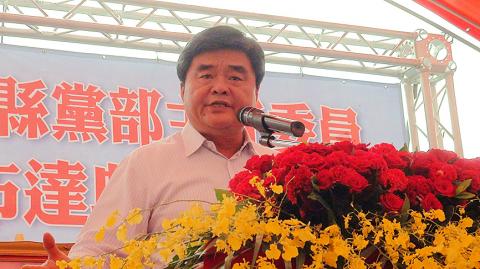The Supreme Court yesterday upheld corruption charges against former Yunlin County commissioner Chang Jung-wei (張榮味) of the Chinese Nationalist Party (KMT).
It sentenced him to eight years in prison and deprived him of civil rights for four years.
Chang, 60, was found guilty of taking NT$30 million (US$983,574) in bribes from a contractor for a government project to build an incinerator while he was Yunlin County commissioner.

Photo: Lin Kuo-hsien, Taipei Times
It was the final ruling, bringing to conclusion a court battle that lasted 14 years.
Chang served two terms as commissioner from 1999 to 2005. He began his political career as Yunlin County council speaker in 1990.
Pundits and social commentators said that Chang’s family had dominated Yunlin politics for the past two decades, and from his base in Yunlin, he controlled many of the transportation, sales and agricultural marketing networks in Taiwan.
His younger sister Chang Li-shan (張麗善) is a KMT legislator representing Yunlin, while his daughter Chang Chia-chun (張嘉郡) served as KMT legislator from 2012 to 2016.
The Chang family is known for its influence in regional farming cooperatives, with Chang Jung-wei’s younger brother Chang Chi-meng (張啟盟) serving as the chairman of the Federation of Taiwan Provincial Agriculture Cooperatives (台灣農業合作社聯合社).
Central Taiwan Farmers Cooperative Association secretary-general Chang Jung-cheng (張永成) is another of Chang’s family members.
The family has in the past controlled the transportation and sales channels of Taipei Agricultural Products Marketing Corp.
The case began in 2004, when the county allocated NT$3.3 billion to build a garbage incinerator in Yunlin’s Linnei Township (林內鄉), with potential contractors Onyx Ta-Ho Co (達和公司) and Ding Shu Co (鼎旭公司) resorting to bribing Yunlin County Government officials to become the contractors for the project.
In yesterday’s ruling, former Linnei township chief Chen Ho-shan (陳河山), was also convicted for taking a NT$16 million bribe from contractors. He was handed the same punishment as Chang.
In the first trial at a district court, Chang Jung-wei was found guilty and handed a 14-year sentence. The court reversed the conviction in a second trial and found him not guilty.
Prosecutors appealed the decision, and the case went to trial a third time, with the Tainan Branch of the Taiwan High Court upholding the earlier conviction and handing Chang Jung-wei a nine-year sentence, which was reduced to eight years in the fourth retrial.
When asked to comment on the ruling, Chang Jung-wei said: “I had thought the justice system would find me innocent, but we see politics has interfered with the case... Now the process is completed, I can do nothing, but face the punishment.”
Secretary-general for Central Taiwan Farmers Cooperative Association Chang Jung-cheng said he could not accept the ruling, as the case had no new evidence and was based on questionable testimonies.
It was the ruling government’s way of derailing the KMT’s election campaign in central Taiwan, Chang Jung-cheng said.

Japanese footwear brand Onitsuka Tiger today issued a public apology and said it has suspended an employee amid allegations that the staff member discriminated against a Vietnamese customer at its Taipei 101 store. Posting on the social media platform Threads yesterday, a user said that an employee at the store said that “those shoes are very expensive” when her friend, who is a migrant worker from Vietnam, asked for assistance. The employee then ignored her until she asked again, to which she replied: "We don't have a size 37." The post had amassed nearly 26,000 likes and 916 comments as of this

US President Donald Trump said "it’s up to" Chinese President Xi Jinping (習近平) what China does on Taiwan, but that he would be "very unhappy" with a change in the "status quo," the New York Times said in an interview published yesterday. Xi "considers it to be a part of China, and that’s up to him what he’s going to be doing," Trump told the newspaper on Wednesday. "But I’ve expressed to him that I would be very unhappy if he did that, and I don’t think he’ll do that," he added. "I hope he doesn’t do that." Trump made the comments in

Tourism in Kenting fell to a historic low for the second consecutive year last year, impacting hotels and other local businesses that rely on a steady stream of domestic tourists, the latest data showed. A total of 2.139 million tourists visited Kenting last year, down slightly from 2.14 million in 2024, the data showed. The number of tourists who visited the national park on the Hengchun Peninsula peaked in 2015 at 8.37 million people. That number has been below 2.2 million for two years, although there was a spike in October last year due to multiple long weekends. The occupancy rate for hotels

A cold surge advisory was today issued for 18 cities and counties across Taiwan, with temperatures of below 10°C forecast during the day and into tonight, the Central Weather Administration (CWA) said. New Taipei City, Taipei, Taoyuan and Hsinchu, Miaoli and Yilan counties are expected to experience sustained temperatures of 10°C or lower, the CWA said. Temperatures are likely to temporarily drop below 10°C in most other areas, except Taitung, Pingtung, Penghu and Lienchiang (Matsu) counties, CWA data showed. The cold weather is being caused by a strong continental cold air mass, combined with radiative cooling, a process in which heat escapes from